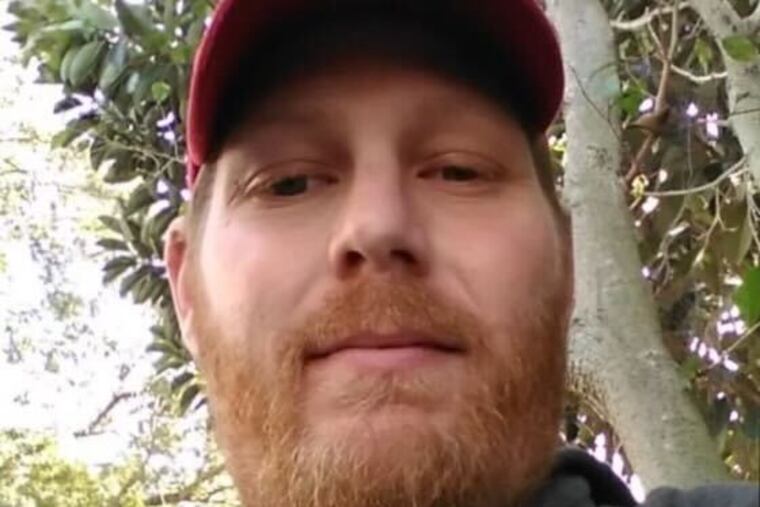A man who was fatally beaten at a city jail should not have been jailed in the first place, lawyer says
Rocco Carbonara, 44, was the subject of an outstanding bench warrant. But it said "DO NOT HOLD," which his lawyers said should have prevented him from being jailed.

A man who was beaten to death inside a Philadelphia jail this week was assaulted within hours of his arrival at the facility. And the Defender Association of Philadelphia, which represented him, said he never should have been behind bars in the first place.
Rocco Carbonara, 44, was arrested Tuesday on a bench warrant connected to a 2019 robbery case that had been put on hold during the pandemic.
A judge had issued that warrant to bring Carbonara to court because he was experiencing homelessness and had missed previous court dates. But, in the warrant’s comments, it said in all capital letters that it was for “SERVICE ONLY,” adding: “DO NOT HOLD.” That “service only” warrant had been in place for more than a year.
A spokesperson for the city, however, pointed out Friday that the bench warrant also contained standard language stating “if the Court is unavailable, the individual may be held in the county jail until the court is opened for business, at which time the individual shall be promptly conveyed and delivered into the custody of the court.”
Based on that, police who stopped Carbonara on Tuesday at 5:30 p.m. in Center City and discovered the outstanding warrant conferred with the warrant unit and took Carbonara to jail, a police spokesperson said.
He arrived at the Curran-Fromhold Correctional Facility in Northeast Philadelphia on Wednesday and was placed in a holding cell with Quadir Qualls, who had already gotten into a fight with another prisoner shortly before being put into a cell with Carbonara.
Around 3:30 a.m. Thursday, Qualls attacked Carbonara, according to law enforcement sources, while a third man in the cell tried to intercede and call for help. Qualls told police Carbonara had been banging his own head against the ground. But the third cellmate described a brutal beating, according to a law enforcement source.
An incident report describes Carbonara’s face as covered in blood, and said medics were called but were unable to revive him.
Whether Carbonara’s arrest was in error, and why he was placed in a cell with Qualls, who had been arrested this week on charges of robbery, assault, and reckless endangerment, are among the many questions remaining about the second homicide and 13th death in the Philadelphia Department of Prisons this year.
Qualls is also listed on court dockets as being represented by the Defender Association of Philadelphia, which declined to comment further on the matter.
The District Attorney’s Office said Friday that charges were being filed against Qualls for murder, assault by a prisoner, reckless endangerment and ethnic intimidation. Its preliminary investigation found that Qualls had said his actions were motivated by the fact that Carbonara was “white” and a “junkie.”
A spokesperson for the District Attorney’s Office said an investigation into the prisons stemming from the escape of two men in May remains ongoing. Another man, Gino Hagenkotter, also escaped from an outdoor work detail at the prisons on Thursday, and remained on the lam Friday afternoon.
As for Carbonara, his charges stem from a 2019 incident in which police say he punched a man in the head and tried to take his wallet and headphones. He was released on unsecured bail. (His name was misspelled Carbonaro in court documents and in initial police and news reports.)
Carbonara, originally from Bradenton, Fla., listed his home address on that warrant as the Kensington location of Prevention Point, the harm reduction nonprofit. Roz Pichardo, who was a longtime outreach worker at the nonprofit, said Carbonara had been around Center City for years, panhandling in what felt like a relatively safe area around 16th and Chestnut.
“He was a respectful man, but he was struggling,” she said. “He would say, ‘I may be blind in one eye, but I see everything.’”
Carbonara’s cousin, Paolo Pasqualicchio, said he had moved from Florida to Philadelphia about eight years ago with his girlfriend. It was his latest attempt to conquer his drug addiction and get back on his feet, his cousin said.
He had an adult son and, according to his Facebook posts, had worked as an Uber driver at times. He liked race cars, and racing, his friend Brandie Heller said. But after losing his parents, she said, he had trouble staying on track.
In the past few years, family and friends had been looking for him and his girlfriend, but, much like the court, had no consistent way of reaching him. They called jails and churches, Heller said, trying to track him down.
“He just kind of lost his way,” she said. “When he got older, he tried to make a new start.”
Staff writer Rodrigo Torrejón contributed to this article.